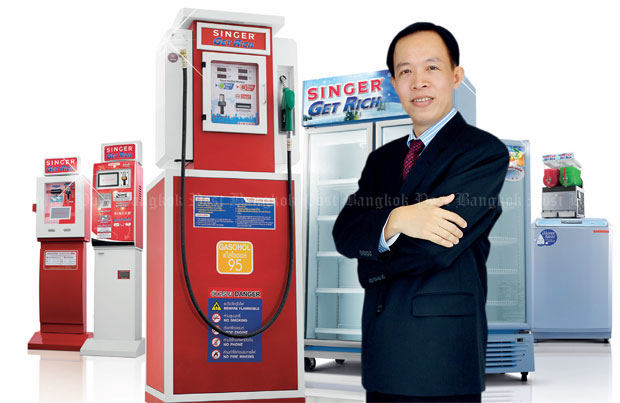Singer Thailand’s non-performing leasing loans to rice farmers have continued to increase, forcing the company to adjust loan qualifications and business models in order to reduce operation risks.

Managing director Boonyong Tansakul poses with just some of Singer Thailand’s commercial products. The company will focus more on entrepreneurs and mom-andpop shops rather than household end-users due to rising NPL levels stemming from late government rice scheme payouts.
It will shift focus to provide commercial products for entrepreneurs and mom-and-pop shops rather than household end-users.
Singer expects the number of non-performing loan (NPL) accounts this quarter to reach 10,800 contracts, 6% of its 180,000 accounts. That would be an increase from 5.3% in the fourth quarter of last year.
Managing director Boonyong Tansakul cited the government’s failure to pay farmers for pledged rice as the reason for the weakened debt servicing of customers.
"Normally, the rice harvest is in November and December, but the late payments have hampered farmers from honouring their instalment payments for their leasing contracts, mostly for electrical appliances," he said.
"We therefore need to adjust the business model by focusing more on entrepreneurs and small operators rather than farmers."
Singer has a range of commercial products aimed at small operators including petrol filling machines, mobile phone top-up machines, beverage freezers and coolers, drink vending machines and laundry machines.
Mr Boonyong said Singer first tested the business model in 2010 after the red-shirt protests in Bangkok. It perceived the company could not do business by relying on government policies amid an unstable political situation.
It has decreased its proportion of agricultural customers from 80% to 25%, with entrepreneurs accounting for 75%.
Singer intends to have its products in all the country’s 75,000 villages by year-end and put them at mom-and-pop shop nationwide next year.
The US-based Singer started business in Thailand in 1905 as Singer Sewing Machine Co and attracted many customers with its instalment repayments.
Today, revenue collected from monthly instalments accounts for 70% of income, with the balance from small businesses.
Sales revenue this year is estimated at 4 billion baht thanks to commercial customers.
Singer's outstanding loans stand at 2 billion baht with a credit line of 11,000 baht per account on average.
It plans to boost customers in the small business sector by reducing monthly instalments to 1,000 to 1,500 baht from 2,500 to 3,000 baht, while the loan term has been extended to two years from 18 months.
Mr Boonyong said the company has also tightened new loan approvals to control asset quality from January by raising the interest rate from 1.8% per month to 2%. It has increased the down-payment ratio from 8% of the goods price to 10%.
Under the strategy, it expects NPLs of no more than 7% by year-end despite the tough situation.
Mr Boonyong said the ongoing political uncertainty and weakened economic growth are also risk factors.
This year, Singer has set a lower loan growth target.
Shares of SINGER closed Thursday on the Stock Exchange of Thailand unchanged at 17.40 baht in trade worth 1.82 million baht.